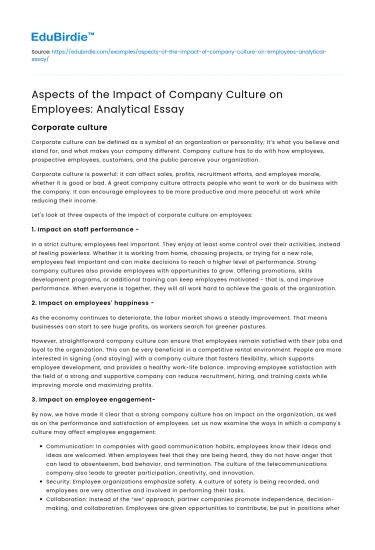Corporate culture
Corporate culture can be defined as a symbol of an organization or personality; it’s what you believe and stand for, and what makes your company different. Company culture has to do with how employees, prospective employees, customers, and the public perceive your organization.
Corporate culture is powerful: it can affect sales, profits, recruitment efforts, and employee morale, whether it is good or bad. A great company culture attracts people who want to work or do business with the company. It can encourage employees to be more productive and more peaceful at work while reducing their income.
Save your time!
We can take care of your essay
- Proper editing and formatting
- Free revision, title page, and bibliography
- Flexible prices and money-back guarantee
Let's look at three aspects of the impact of corporate culture on employees:
1. Impact on staff performance -
In a strict culture, employees feel important. They enjoy at least some control over their activities, instead of feeling powerless. Whether it is working from home, choosing projects, or trying for a new role, employees feel important and can make decisions to reach a higher level of performance. Strong company cultures also provide employees with opportunities to grow. Offering promotions, skills development programs, or additional training can keep employees motivated - that is, and improve performance. When everyone is together, they will all work hard to achieve the goals of the organization.
2. Impact on employees' happiness -
As the economy continues to deteriorate, the labor market shows a steady improvement. That means businesses can start to see huge profits, as workers search for greener pastures.
However, straightforward company culture can ensure that employees remain satisfied with their jobs and loyal to the organization. This can be very beneficial in a competitive rental environment. People are more interested in signing (and staying) with a company culture that fosters flexibility, which supports employee development, and provides a healthy work-life balance. Improving employee satisfaction with the field of a strong and supportive company can reduce recruitment, hiring, and training costs while improving morale and maximizing profits.
3. Impact on employee engagement-
By now, we have made it clear that a strong company culture has an impact on the organization, as well as on the performance and satisfaction of employees. Let us now examine the ways in which a company's culture may affect employee engagement:
- Communication: In companies with good communication habits, employees know their ideas and ideas are welcomed. When employees feel that they are being heard, they do not have anger that can lead to absenteeism, bad behavior, and termination. The culture of the telecommunications company also leads to greater participation, creativity, and innovation.
- Security: Employee organizations emphasize safety. A culture of safety is being recorded, and employees are very attentive and involved in performing their tasks.
- Collaboration: Instead of the “we” approach, partner companies promote independence, decision-making, and collaboration. Employees are given opportunities to contribute, be put in positions where they can succeed, and provide opportunities to build meaningful relationships with managers and co-workers.
- Growth: The elements that promote employee development and growth give employees something to work on and to look forward to. Such cultures prevent the boredom and intensity of activities while keeping things fun and exciting.
In today's competitive business environment, everything from sales to hire becomes a major challenge. One way to make everything easier is to become a company that people want to do business with and work for. Smart organizations know that strong and strong company culture is one of their most important assets.






 Stuck on your essay?
Stuck on your essay?

